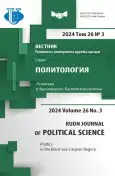Iran’s Security Policy in the Caspian Region
- Авторлар: Medushevskii N.A.1, Filin N.A.1, Koklikov V.O.1, Samoilova E.E.1
-
Мекемелер:
- Russian State University for the Humanities
- Шығарылым: Том 26, № 3 (2024): Politics in the Black Sea-Caspian Region
- Беттер: 502-519
- Бөлім: THE CASPIAN REGION AND THE CAUCASUS: SECURITY AND DEVELOPMENT
- URL: https://journal-vniispk.ru/2313-1438/article/view/322419
- DOI: https://doi.org/10.22363/2313-1438-2024-26-3-502-519
- EDN: https://elibrary.ru/BGCCGI
- ID: 322419
Дәйексөз келтіру
Аннотация
The Caspian region is a strategically important area in the world. Before the collapse of the Soviet Union, the Caspian Sea was divided between Iran and the USSR under an agreement. The article examines Iran’s foreign policy and security approach in the Caspian Sea, with a focus on the goals pursued by the Islamic Republic of Iran in this regard and the measures taken. The article uses the problem-chronological method, content analysis and event analysis. As a result, it was revealed that Iran pursued the goal of achieving an equal, from its point of view, distribution of the Caspian Sea waters, defending its point of view at the summits of the Caspian states, but the exact percentage of the waters belonging to Iran has not yet been determined, which largely determines the delay of the Iranian side in ratifying the Convention on the Legal Status of the Caspian Sea. However, Iran is generally satisfied with the agreements reached with the Caspian countries in the field of security and the prevention of foreign military presence in the Caspian.
Негізгі сөздер
Авторлар туралы
Nikolay Medushevskii
Russian State University for the Humanities
Хат алмасуға жауапты Автор.
Email: lucky5659@yandex.ru
ORCID iD: 0000-0003-0475-6713
Doctor of Political Sciences, Professor of the Department of Modern East and Africa of the Faculty of Oriental Studies and Social and Communicative Sciences
Moscow, Russian FederationNikita Filin
Russian State University for the Humanities
Email: n.filin@rggu.ru
ORCID iD: 0000-0002-4764-6939
Doctor of Historical Sciences, Head of the Department of Modern East and Africa of the Faculty of Oriental Studies and Social and Communicative Sciences
Moscow, Russian FederationVladimir Koklikov
Russian State University for the Humanities
Email: azzuro@list.ru
ORCID iD: 0009-0002-2035-5637
Senior Lecturer of the Department of Modern East and Africa of the Faculty of Oriental Studies and Social and Communicative Sciences
Moscow, Russian FederationElena Samoilova
Russian State University for the Humanities
Email: helenaxsam@gmail.com
ORCID iD: 0009-0005-4780-1440
Secretary-Administrator of the Department of Modern East and Africa of the Faculty of Oriental Studies and Social and Communicative Sciences
Moscow, Russian FederationӘдебиет тізімі
- Al-Eslami, Sh., Hossein, M., Hosseini, S.M.H., & Shiravand, S. (2014). The impact of military activities of extra-Regional elements of the Caspian sea on the national security of the Islamic Republic of Iran. Quarterly Journal of Central Asian and Caucasus Studies, 89, 124–150. (in Persian).
- Chernyavsky, S. (2002). The Caspian problem. Politics and Law of Russia, 3 (1), 85–94. (in Russian).
- Darabadi, P.G. (2010). The Caucasus and the Caspian in World History and Geopolitics of the 21st Century. Moscow: ves’ mir. 214 p. (in Russian).
- Filin, N.A. (2020). legitimization of the power of the supreme leader (Rahbar) of iran according to the interpretation of the main Iranian political and Religious Figures. Bulletin of the Russian State University for the Humanities. Series «Political Science. History. International Relations», 4, 230–238. (in Russian).
- Haqqbin, M., & Zhivotenkov, A.N. (2021). Iran’s Position on Ratification of the Convention on the legal status of the Caspian sea in the Context of integration processes in the Caspian. Locus: People, Society, Cultures, Meanings, 12 (3), 122–142. (in Russian). https://doi.org/10.31862/2500-2988-2021-12-3-122-142.
- Jafari Valdani, A., & Hosseini, S.M.H. (2016). The impact of military activities of extra- Regional elements of the Caspian sea on the national security of the Islamic Republic of Iran. Quarterly Journal of Central Asian and Caucasus Studies, 97, 52–65. (in Persian).
- Kariani, M. (2014). Bilateral agreements: a new political approach to oil production in the Caspian sea. Quarterly Journal of Central Asian and Caucasus Studies, 5, 198–209. (in Persian).
- Lal Alizade, M., & Bagheri, M. (2016). studying the implementation of the legal system of Joint sovereignty (Condominium) in the Caspian sea with an emphasis on the activities of Coastal states. Quarterly Journal of International Law, 25, 144–159. (in Persian).
- Magomedov, M.K. (2018). The Caspian Sea on the Geopolitical Routes of Northern Eurasia: Energy-Political and Transport Dimensions at the Turn of the 20th-21st Centuries. Ulyanovsk: Ulyanovsk state university. 243 p. (in Russian).
- Maleki, A. (2009). Energy Security, Iran And Caspian Sea Issues. Quarterly Journal of Central Asian and Caucasus Studies, 70, 142–151. (in Persian).
- Markelov, K.A. (2020). Greater Caspian in the Geopolitical Dimension. Moscow: ekon-inform. 198 p. (in Russian).
- Medushevsky, N.A. (2022). Cooperation between Iran and Russia in the Caspian Region in the materials of Foreign analysts. Russia and Iran: Five Centuries of Cooperation. Collection of Materials of the International Scientific Conference. eds.: A.B. Bezborodov, V.V. Naumkin, A.K. Alikberov. Moscow: 2022. p. 64–73. (in Russian).
- Mohammadi Al-Muti, M. (2006). Factors influencing the foreign policy of the Islamic Republic in determining the legal status of the Caspian sea. Quarterly journal «Religion and Politics», 10, 81–109. (in Persian).
- Momtaz, D. (1995). legal status of the Caspian sea. Quarterly Journal of Central Asian and Caucasus Studies, 10, 123–130. (in Persian).
- Mousavi, R. (2009). The Future of the Caspian sea. Quarterly Journal of Central Asian and Caucasus Studies, 65, 10–12. (in Persian).
- Pfanenstiel, I.A., Yatsenko, M.P., Maksimov, S.V., & Molodykh, L.L. (2019). Confrontation between Russia and the West in the context of global geopolitical transformations: a socio-philosophical analysis. Krasnoyarsk: Siberian Federal university. 390 p. (in Russian).
- Pivovar, e.i. (2019). special legal status of the Caspian. Results and prospects of the v Caspian summit in aktau. Bulletin of the Russian State University for the Humanities. Series «Eurasian studies. History. Political science. International relations», 1, 12–32. (in Russian).
- Podlesny, P.T. (2022). New world order for the 21st century: views from Washington and the interests of Russia. Moscow: ves’ mir. 218 p. (in Russian).
Қосымша файлдар









